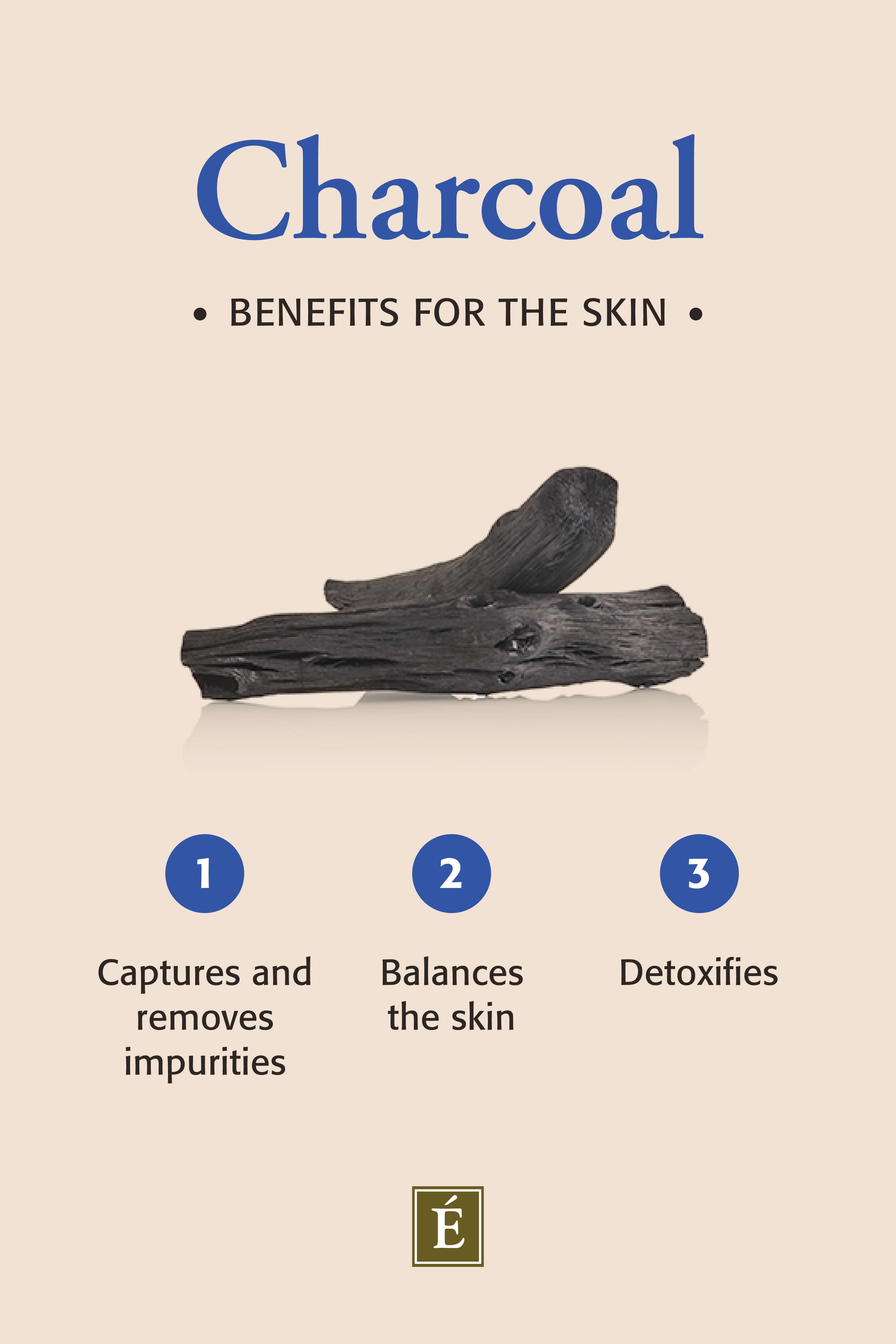
As natural skin care ingredients gain popularity, charcoal has become increasingly recognized for its ability to detoxify and purify the skin. But does charcoal live up to its reputation? You may be surprised to learn that this ingredient is very effective in reducing excess oil and impurities from your skin, which helps to eliminate buildup and tackle pore congestion — like blackheads. It also gives your skin a matte finish, taking away the unwanted shine that comes with oily skin, leaving it looking clear and refined. Let’s take a closer look at charcoal in skin care, examining its benefits and effectiveness.
Types Of Charcoal In Skin Care
Derived from natural sources like coconut shells, bamboo and oak, charcoal is renowned for its ability to detoxify and balance the skin naturally. In the context of skin care, we’re looking at two main types: activated charcoal and binchotan charcoal. Let’s explore the most common benefits and claims about charcoal’s effectiveness in more detail.
Activated Charcoal
Activated charcoal is derived from natural materials, such as coconut shells or oak wood, and is effective in reducing comedones, which can be partly attributed to its capacity to absorb excess oil and prevent pore clogging. Its porous texture means it’s often used for deep-cleaning the skin.
Binchotan Charcoal
Binchotan isn’t as well-known in Western skincare, but it’s a traditional Japanese form of charcoal, deriving from the high-quality Ubame oak wood. It also detoxifies and balances the look of the skin. It is acclaimed for its ability to adsorb — rather than absorb — impurities. This means that impurities on the skin are sucked up and stick to the charcoal’s surface. This adsorbing action makes activated charcoal a popular choice for refining and balancing oily or blemished-looking skin. Now that you know the types of charcoal to look for in your products, let’s take a look at its benefits.
What Are The Benefits Of Charcoal In Skin Care?
Charcoal is beneficial in treating pore congestion, a condition often marked by the accumulation of debris, dead skin cells, makeup and other impurities in the pores. You might have congested pores if you notice symptoms such as:
Excess oil
Enlarged pores
Blackheads
Whiteheads
A distressed or dull appearance
Rough, bumpy, uneven skin texture
Charcoal can help with:
Managing Sebum & Enlarged Pores To Remove Impurities
For those with oily or acne-prone skin, activated charcoal can help manage the overproduction of sebum, which is responsible for enlarging pores. Enlarged pores tend to get clogged with oil, dirt and dead skin cells, potentially leading to uneven skin texture. By drawing out oil and debris, charcoal may reduce the likelihood of pores becoming clogged.
Balancing The Skin Through Oil Regulation
By effectively eliminating debris and excess sebum (the culprits behind clogged pores), charcoal aids in creating a smoother and more refined-looking skin texture. This makes it particularly advantageous for those with oily or combination skin types.
Detoxification & Deep Cleansing
One of the central claims is that charcoal can act as a magnet for impurities, drawing them out of the skin’s pores. This is based on its highly porous structure, which gives it a large surface area for trapping impurities. This detoxifying property helps improve skin health by removing trapped dirt and reducing congestion by getting rid of bacteria and oil from the pores.
Exfoliation & Brightening
Activated charcoal is known for its exfoliating power due to its fine, gritty texture, which makes it ideal for use in facial and body scrubs. Regular exfoliation helps remove dead skin cells, making the skin appear more radiant and refreshed. This texture allows it to gently but effectively polish the skin’s surface, helping to remove dead skin cells and reveal a brighter, smoother-looking complexion.
Is Charcoal Good For Skin? Considerations & Recommendations
While the benefits of charcoal in skin care are numerous, it’s important to approach its use with certain considerations in mind, as different skin types and sensitivities can have varied responses to charcoal-based products.
Skin Type & Sensitivity
Not all skin is created equal; naturally, this means different skin types have distinct needs. Those with dry or sensitive skin might find charcoal products a little intense, as they could exacerbate dryness or cause irritation. But, this doesn’t mean they’re off limits. It’s important to do a patch test and to introduce any new product gradually to see how your skin reacts. Many find that with the right frequency and product formulation, charcoal can be a beneficial addition to their routine, regardless of the skin type.
Proper Usage & Frequency
Skin care is not one-size-fits-all and this is especially true for charcoal products. The key to harnessing the benefits of charcoal without overdoing it lies in understanding proper usage and frequency. This includes considering other products in your routine, how often you’re using charcoal-infused products and in what form it is used.
So, back to the burning question — is charcoal good for your skin? It appears that when used correctly and with consideration for individual skin types, charcoal can indeed benefit skin, from aiding in the reduction of imperfections to polishing the skin’s surface. Skin care success relies not on a singular ingredient, but on a thoughtful regimen tailored to your skin’s unique needs. If you’re considering introducing charcoal into your routine, do so with an informed approach. Visit a professional esthetician for an assessment and take the time to understand your skin’s requirements and how it responds. After all, the best skin care routine is one that makes you feel comfortable and confident in your skin.
Have you ever used charcoal on your skin? Let us know in the comments below. Visit an Eminence Organics Spa Partner and an esthetician can professionally diagnose your skin type and recommend products that will help it look and feel its best.




